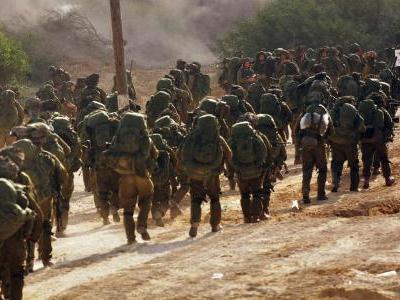Fri, 08/08/2014 - 18:01
Jailed for refusing to serve in Israel’s Gaza offensive
On August 11, Gilad Halpern will turn 33, but he won’t be home for his birthday. The following week, his son will be turning two. But Halpern won’t be home for his son’s birthday either – he will mark that milestone in an Israeli prison.
That’s the price Halpern says he’s willing to pay for being a conscientious objector and refusing to participate in Israel’s latest deadly offensive in Gaza that has killed more than 1,800 Palestinians, according to Palestinian officials, and more than 65 Israelis, mostly soldiers.
In a July 30 column noting “the absence of a mass opposition to Israel’s crimes against the Gaza population,” Israeli anti-Zionist activist Michel Warschawski asked, “Where are the refuseniks?”
There may not be as many refuseniks – the unofficial term for conscientious objectors in Israel – in the current Gaza operation compared to earlier wars, such as the 1980s conflict in Lebanon.
But to answer Warschawski’s question on the missing refuseniks: there are hundreds of them, sometimes in places you’d least expect.
When I met Halpern back in 2011, there was never any doubt that the new, lanky freelancer on France 24’s English website was an Israeli “leftie,” but we didn’t discuss the Middle East. A year later, Halpern left France to return home, where he worked at a left-wing Israeli daily before joining an English-language radio station in Tel Aviv. Along the way, he had a baby, we posted “likes” on respective Facebook pages and that was all there was to it.
But on Friday, when I called him on his mobile, Halpern was under arrest at a military base in southern Israel. At a hearing the previous day, the Israeli journalist was given a 21-day sentence – starting immediately – for refusing to serve his army division in Gaza. On Sunday, he expects to go to jail, where his mobile will probably be impounded – until then, Halpern said, he can move around the base, but can’t leave the premises.
“I wanted to make a principled stance, to say this is something I find abhorrent,” said Halpern, referring to Operation Protective Edge. “I’m willing to pay the price. It’s an act of modest solidarity – so many people have suffered a lot more,” he added with characteristic humility.
From the end of the peace process to the second intifada
Halpern is no stranger to Israeli operations in the Palestinian territories. In 1999, when he began his mandatory three-year military service shortly after turning 18, Halpern witnessed the dying days of the peace process. By the end of his compulsory service, the second Palestinian intifada was at its height and the young Israeli served as a combat soldier in an armored division in the West Bank.
Under Israeli law, mandatory military conscription requires three years of service for men and two for women from the age of 18. Certain groups, including most Israeli Arabs and Yeshiva students, are exempt from mandatory service. Israeli males may also be called up for reserve duty of up to a month annually until the age of 45.
Since Operation Protective Edge began on July 8, Israel has called up a total of 86,000 reserves as the conflict has widened into a deadly ground offensive. But while the Gaza operation enjoys overwhelming popular support in Israel, there have been a number of conscientious objector campaigns, including a petition by ex-soldiers who have refused to report for reserve duties.

More than a decade ago, during his compulsory service in the West Bank at the height of the second intifada, Halpern said he believed in the cause. In an interview with a French news site, he noted that, “I was aware that the treatment of the Palestinians by Israel was unjust and unjustifiable, but I believed, and I still believed it several years after the end of my [military] service, that it was a temporary pause in the peace process. I thought it was in Israel’s interest to put an end to this long conflict.”
But that changed in 2009, when he was called up for reserve service during Operation Cast Lead, when Israel launched an offensive in Gaza, which killed more than 1,400 Gazans, according to Palestinian officials. Three Israeli civilians and 10 soldiers were killed in the operation.
“I was really horrified with what seemed an exceptionally brutal operation that wrecked havoc in Gaza,” explained Halpern. “I came to the conclusion, as of 2009, that I’m not willing to defend an Israeli policy of hitting Gaza every two years. The current conflict is not at all necessary. The Israeli government had several opportunities to ease the tensions with Hamas. I am no longer willing to give my name to brutal measures which can easily be avoided and I will refuse it.”
An airport arrest
So, on July 17, when Halpern received his call-up order, he spent the next few days in a bureaucratic haze of phone calls explaining to various military officials that he did not intend to show up for reserve duty. He was finally given a 12-hour ultimatum to join his unit or his case would be transferred to the military police. At that stage, Halpern boarded a flight to the Netherlands, leaving Israel a day before international airlines briefly suspended flights to Tel Aviv.
“We had planned a holiday for the following week, but I flew to the Netherlands alone – my family joined me later,” he explained.
It was upon his return home – with his family – on Wednesday that Halpern was arrested at Tel Aviv’s Ben Gurion Airport and taken to the military base in southern Israel, where he faced a military hearing.
“I told the [presiding military] official that it was a principled act of refusing to take part in the fighting and that it’s a decision that wasn’t made very easily because I have served in the army before,” he recounted.
Despite the pivotal role of the military as an institution that defends and unites Israel, the country has a history of refusenik movements. In recent years, following the rightward slide in Israeli politics and public opinion, the vilification of refuseniks has increased as Israel finds itself increasingly isolated on the international stage.
Halpern however says his family and friends have been very supportive of his decision – and that includes his wife who hails from a family with a proud military background. A Facebook post with a deceptively breezy message announcing “Summer in the slammer” drew comments such as, “Oh no! Proud to be your friend” and “Very brave of you Gilad. I support your action”.
But outside the select circle of family and Facebook friends, conscientious objectors face the wrath of a militarized society with little patience for draft dodgers.
At the military base where soldiers are in normal service, Halpern has simply said he went AWOL without revealing the political reasons for his decision. “People with my positions are often viewed as people who identify with the enemy – there’s been an upsurge in nationalistic discourse,” explained Halpern. “I wouldn’t like to start a political debate, which would put me in an awkward position here.”
Looking back on his experience over the past few weeks, Halpern notes that he could have handled things differently. “I could have got out on some technicality, made some excuse – it’s been done before,” he said. “But in my case, I wanted to make a principled stance. I don’t regret it. I couldn’t take it anymore. We must take a rather radical stand and must do something. By going to jail, I am doing something. Now I will be able to speak about it – not just as an Israeli, but as someone who paid a price for it.”
That’s the price Halpern says he’s willing to pay for being a conscientious objector and refusing to participate in Israel’s latest deadly offensive in Gaza that has killed more than 1,800 Palestinians, according to Palestinian officials, and more than 65 Israelis, mostly soldiers.
In a July 30 column noting “the absence of a mass opposition to Israel’s crimes against the Gaza population,” Israeli anti-Zionist activist Michel Warschawski asked, “Where are the refuseniks?”
There may not be as many refuseniks – the unofficial term for conscientious objectors in Israel – in the current Gaza operation compared to earlier wars, such as the 1980s conflict in Lebanon.
But to answer Warschawski’s question on the missing refuseniks: there are hundreds of them, sometimes in places you’d least expect.
When I met Halpern back in 2011, there was never any doubt that the new, lanky freelancer on France 24’s English website was an Israeli “leftie,” but we didn’t discuss the Middle East. A year later, Halpern left France to return home, where he worked at a left-wing Israeli daily before joining an English-language radio station in Tel Aviv. Along the way, he had a baby, we posted “likes” on respective Facebook pages and that was all there was to it.
But on Friday, when I called him on his mobile, Halpern was under arrest at a military base in southern Israel. At a hearing the previous day, the Israeli journalist was given a 21-day sentence – starting immediately – for refusing to serve his army division in Gaza. On Sunday, he expects to go to jail, where his mobile will probably be impounded – until then, Halpern said, he can move around the base, but can’t leave the premises.
“I wanted to make a principled stance, to say this is something I find abhorrent,” said Halpern, referring to Operation Protective Edge. “I’m willing to pay the price. It’s an act of modest solidarity – so many people have suffered a lot more,” he added with characteristic humility.
From the end of the peace process to the second intifada
Halpern is no stranger to Israeli operations in the Palestinian territories. In 1999, when he began his mandatory three-year military service shortly after turning 18, Halpern witnessed the dying days of the peace process. By the end of his compulsory service, the second Palestinian intifada was at its height and the young Israeli served as a combat soldier in an armored division in the West Bank.
Under Israeli law, mandatory military conscription requires three years of service for men and two for women from the age of 18. Certain groups, including most Israeli Arabs and Yeshiva students, are exempt from mandatory service. Israeli males may also be called up for reserve duty of up to a month annually until the age of 45.
Since Operation Protective Edge began on July 8, Israel has called up a total of 86,000 reserves as the conflict has widened into a deadly ground offensive. But while the Gaza operation enjoys overwhelming popular support in Israel, there have been a number of conscientious objector campaigns, including a petition by ex-soldiers who have refused to report for reserve duties.

More than a decade ago, during his compulsory service in the West Bank at the height of the second intifada, Halpern said he believed in the cause. In an interview with a French news site, he noted that, “I was aware that the treatment of the Palestinians by Israel was unjust and unjustifiable, but I believed, and I still believed it several years after the end of my [military] service, that it was a temporary pause in the peace process. I thought it was in Israel’s interest to put an end to this long conflict.”
But that changed in 2009, when he was called up for reserve service during Operation Cast Lead, when Israel launched an offensive in Gaza, which killed more than 1,400 Gazans, according to Palestinian officials. Three Israeli civilians and 10 soldiers were killed in the operation.
“I was really horrified with what seemed an exceptionally brutal operation that wrecked havoc in Gaza,” explained Halpern. “I came to the conclusion, as of 2009, that I’m not willing to defend an Israeli policy of hitting Gaza every two years. The current conflict is not at all necessary. The Israeli government had several opportunities to ease the tensions with Hamas. I am no longer willing to give my name to brutal measures which can easily be avoided and I will refuse it.”
An airport arrest
So, on July 17, when Halpern received his call-up order, he spent the next few days in a bureaucratic haze of phone calls explaining to various military officials that he did not intend to show up for reserve duty. He was finally given a 12-hour ultimatum to join his unit or his case would be transferred to the military police. At that stage, Halpern boarded a flight to the Netherlands, leaving Israel a day before international airlines briefly suspended flights to Tel Aviv.
“We had planned a holiday for the following week, but I flew to the Netherlands alone – my family joined me later,” he explained.
It was upon his return home – with his family – on Wednesday that Halpern was arrested at Tel Aviv’s Ben Gurion Airport and taken to the military base in southern Israel, where he faced a military hearing.
“I told the [presiding military] official that it was a principled act of refusing to take part in the fighting and that it’s a decision that wasn’t made very easily because I have served in the army before,” he recounted.
Despite the pivotal role of the military as an institution that defends and unites Israel, the country has a history of refusenik movements. In recent years, following the rightward slide in Israeli politics and public opinion, the vilification of refuseniks has increased as Israel finds itself increasingly isolated on the international stage.
Halpern however says his family and friends have been very supportive of his decision – and that includes his wife who hails from a family with a proud military background. A Facebook post with a deceptively breezy message announcing “Summer in the slammer” drew comments such as, “Oh no! Proud to be your friend” and “Very brave of you Gilad. I support your action”.
But outside the select circle of family and Facebook friends, conscientious objectors face the wrath of a militarized society with little patience for draft dodgers.
At the military base where soldiers are in normal service, Halpern has simply said he went AWOL without revealing the political reasons for his decision. “People with my positions are often viewed as people who identify with the enemy – there’s been an upsurge in nationalistic discourse,” explained Halpern. “I wouldn’t like to start a political debate, which would put me in an awkward position here.”
Looking back on his experience over the past few weeks, Halpern notes that he could have handled things differently. “I could have got out on some technicality, made some excuse – it’s been done before,” he said. “But in my case, I wanted to make a principled stance. I don’t regret it. I couldn’t take it anymore. We must take a rather radical stand and must do something. By going to jail, I am doing something. Now I will be able to speak about it – not just as an Israeli, but as someone who paid a price for it.”
Comments or opinions expressed on this blog are those of the individual contributors only, and do not necessarily represent the views of FRANCE 24. The content on this blog is provided on an "as-is" basis. FRANCE 24 is not liable for any damages whatsoever arising out of the content or use of this blog.




1 Comments
Post new comment